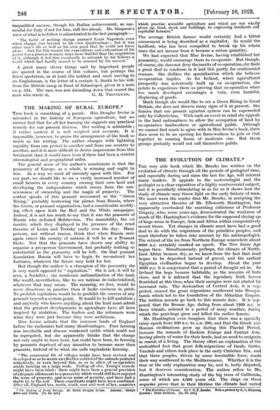saturated in the history of European agriculture, but we cannot
find that for all her learning she suggests any practical remedy for our present distress. Her writing is admirable ; if rather austere it is well weighed and accurate. It is impossible, however, to praise the arrangement of the book so much as the writing. The author changes with lightning rapidity from one period to another and from one country to another, and it is more difficult to derive impressions from this treatment than it would have been if there had been a stricter chronological and geographical order.
The general sense of the author's conclusions is that the peasantry of Europe, as a whole, is winning and ought to win. In a way we must all sincerely agree with this. For our part, we should like to see a vastly increased number of small farmers in every country owning their own land and developing the independence which comes from the con- sciousness of ownership and the magic of property. The author speaks of this peasant movement as the " Green Rising," probably borrowing the phrase from Russia, where the Green, or peasant organization, had a considerable modify- ing effect upon both the Red and the White campaigns. Indeed, it is not too much to say that it was the peasants of Russia who defeated Bolshevism. The immobility, the vis inertice, which they displayed in the presence of the cruel theories of Lenin and Trotsky easily won the day. Many persons, not without reason, think that when Russia once again enters the comity of nations it will be as a Peasant State. Not that the peasants have shown any ability to organize a prosperous Government, but probably nothing so substantial as the peasantry will be left. On that peasant foundation Russia will have to begin to reconstruct her fortunes, whatever the future may hold for her.
But though the author is a champion of the peasantry she is very much opposed to " capitalism." She is not, it will be seen, a Socialist ; she condemns nationalization of the land.
She would, nevertheless, like to see nations de-industrialized, whatever that may mean. The meaning, we fear, would be more disastrous in practice than it looks ominous in print. To prohibit capitalism would be to prohibit the success of any peasant beyond a certain point. It would be to kill ambition ; and anybody who knows anything about the land must admit that the greatest developments in agriculture have all been inspired by ambition. The leaders and the reformers were what they were just because they were ambitious.
Miss Irvine admits that the common lands of England before the enclosures had many disadvantages. Poor farming was inevitable and disease weakened cattle which could not be segregated, but she apparently thinks that the change not only ought to have been, but could have been, to farming by peasants deprived of any incentive to become more than peasants, instead of to what she calls capitalistic farming.
" The communal life of villages might have been revived and developed so as to secure an effective control of the animals pastured collectively, or even beyond this, so as to allow of co-operative arable farming on a large scale. Failing all else, Young's remedy might have been tried : there might have been a general provision of adequate allotments to a peasantry which would still have enjoyed the sense of property, and some sense of security, and have had a stable tie to the soil. These expedients might have been combined. After all, England has, north, south, east and west of her, countries Allen and 1.7umin. 17a. Eld. net.) London: Bean Brothers. Led. 6d. net,' which practise scientific agriculture and which are not wholly given up, land, stock and buildings, to engrossing landlords an capitalist farmers."
The average British farmer would certainly find a bitter amusement is being described as a capitalist. So would the landlord, who has been compelled to break up his estate since the net income from it became a minus quantity.
We had expected that Miss Irvine, having established her peasantry, would encourage them to co-operate. But though, of course, she does not deny the:merits of co-operation, she finds a great deal to condemn in it and this partly for sentimental reasons. She dislikes the specialization which she believes co-operation implies. As for Ireland, where agricultural prosperity was notoriously built up on co-operation, she points to experience there as proving that co-operation when too much developed encourages a vain, even harmful, displacing of goods.
Much though she would like to see a Green Rising in Great Britain, she does not discern many signs of it at present. She fancies that our present agrarian system can be superseded only by Collectivism. With such an event in mind she appeals to the land nationalizers to allow the occupation of land by co-operative landworkers or agricultural guilds. Although we cannot find much to agree with in Miss Irvine's book, there does seem to be an opening for farm-workers to join or club together in running farms of moderate size. But these groups probably would not call themselves guilds.


































































 Previous page
Previous page